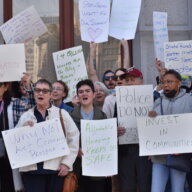 Cheri Honkala led the charge to file a criminal complaint against the state official responsible for the LIHEAP program. (Credit: Facebook).
Cheri Honkala led the charge to file a criminal complaint against the state official responsible for the LIHEAP program. (Credit: Facebook).
Advocates with the Poor People’s Economic Human Rights Campaign on Tuesday filed criminal charges against Catherine Buhrig, Pennsylvania’s division director for federal programs, who oversees the state’sLow Income Home Energy Assistance Program.
LIHEAP, though the Pennsylvania Department of Public Welfare, administers federal funds in the form of cash grants to low income residents at risk of utility termination during the months of January through April.
But activists claim a massive backlog during the most recent season caused administrators to overlook thousands of LIHEAP applications and fail to dole out millions of dollars before the end of the enrollment period, leaving many eligible households that applied for emergency relief out in the cold.
“We’ve seen at the end of the program, people who have been waiting and waiting and waiting for LIHEAP assistance, and the program closes, so they’re no longer eligible,” said attorney Maripat Pileggi of Community Legal Services’ Welfare Unit.
“But they are still faced with termination notices.”
Poor People’s Economic Human Rights Campaign national coordinator Cheri Honkala led the charge to file a criminal complaint against Buhrig alleging simple assault and harassment after Buhrig refused to resign her post.
“Why is it we live in a state where, if you let your dog freeze to death, you face criminal charges, but if [officials] let my kids freeze to death, or a senior down the block, it’s not a criminal manner?” she said.
She said that, since the state has no plans to institute a moratorium on utilities shutoffs despite the fact they admittedly did not process all of the applications they received, she hopes the legal proceedings will “put a wrench in the process” and delay the terminations.
“When somebody dies because they got hypothermia, they didn’t die because they got hypothermia,” she said.
“They died because their household’s LIHEAP application was not processed and they never received any money.”
Other speakers at a contentious public hearing on the topic Tuesday morning blasted Buhrig and other state officials for practices they claim caused the delay.
“The DPW should be ashamed,” said Michael D’Amico, a state employee who has for 31 years processed LIHEAP applications and also represents social services workers union SEIU Local 668.
“There was a backlog of 14,000 LIHEAP applications at the end of the program on April 26, 2013. That’s 14,000 families in danger of losing heat or hot water.”
He said not only do employees face staffing shortages, but that this year the state also forced caseworkers who don’t usually handle energy assistance requests to process LIHEAP applications.
“The problem is, because they also have to do either medical assistance or food stamp applications, several thousand [LIHEAP] applications were not processed until months after they were put in the computer,” he said.
Another issue raised at the hearing was that Pennsylvania simply never gave out an estimated $31 million in LIHEAP funds allocated by the federal government during the most recent season.
Buhrig said the state didn’t receive $16 million of those funds from federal authorities until after the program ended in May, and said she is not sure when they will be issued to applicants.
“This is not an issue of scarcity,” Honkala replied.
“You have had access to millions of dollars. Those dollars have not been used in a way to protect Philadelphia and Pennsylvania’s most vulnerable citizens.”
Honkala said she’s optimistic prosecutors will be receptive to the criminal complaint.
“[District Attorney] Seth Williams definitely knows me, definitely knows what we represent and definitely knows this is not a laughing matter and that it should be against the law to not process applications and to potentially allow women, children and seniors to freeze to death in the city,” she said.





























